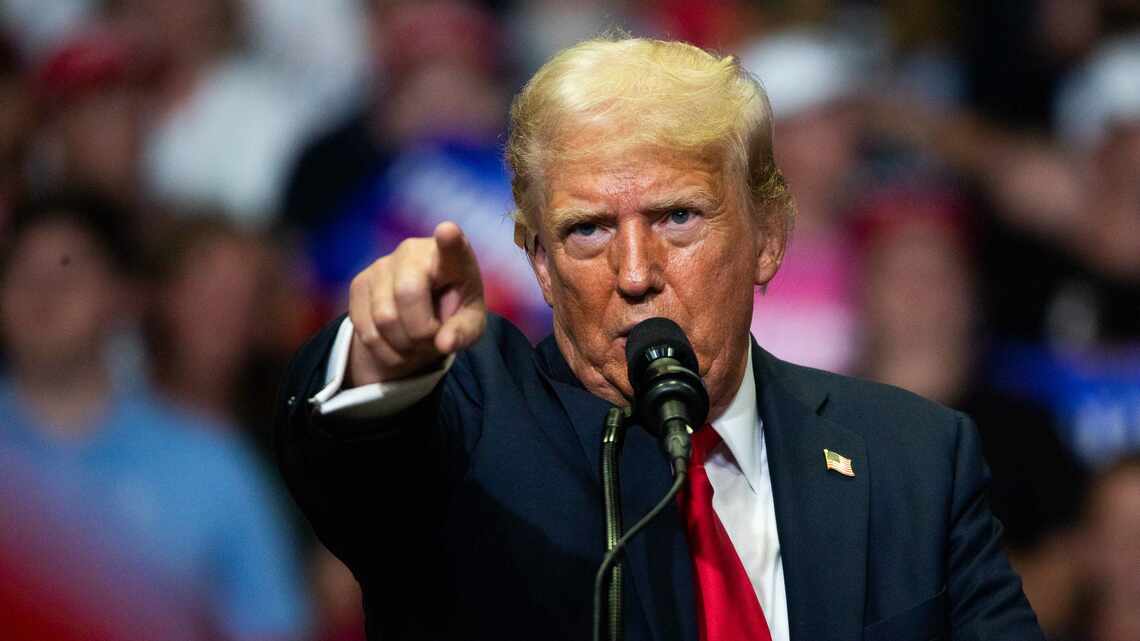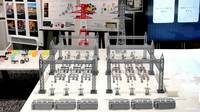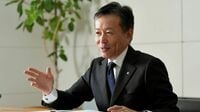
Japan, along with the rest of the world, is watching with growing unease the seemingly unending turbulence of the American presidential election campaign.
The past month has been a roller coaster, beginning with President Joe Biden's disastrous debate performance, which triggered rising cries within his own party for him to step aside. Former President Donald Trump, already buoyed by Biden’s troubles, narrowly escaped an assassin’s bullet, an iconic moment that boosted his political fortunes.
On Sunday, the election took another dramatic turn when Biden announced his decision to withdraw from the race. The President immediately endorsed Vice President Kamala Harris as the Democratic party's nominee.
The outcome of this chaotic election is far from certain. However, as of now, the prospect that Trump will return to power in Washington must be taken seriously.
The Republican convention cemented the control of that party by an isolationist, protectionist, and Christian nationalist movement – the so-called MAGA (Make American Great Again) movement that harkens back to the neo-fascism of the 1930s.
The choice of a novice Senator from Ohio, JD Vance, as the Vice-Presidential candidate confirmed that takeover. Vance is a deep advocate of the ideology of this movement.
What might Trump’s return to power mean for Japan and for other allies who remain highly dependent on the United States as the bastion of what remains of the postwar order? This writer sought the advice of prominent and respected Japan experts in the United States – Richard Samuels of the Massachusetts Institute of Technology (MIT), and Sheila Smith of the Council on Foreign Relations (CFR).
Together, we have constructed a list of the 5 most likely nightmares for Japan should Trump and his movement triumph in November. It is by no means an exhaustive list – more dangers no doubt lurk beyond these.
NIGHTMARE ONE: TRADE WAR AND ECONOMIC FRICTION
Trump has repeatedly announced plans to impose an across-the-board 10 percent tariff on all imported goods, and an even larger – 50-60 percent – tariff on Chinese imports. He has been an advocate of trade protectionism for decades. “Economically, they’re phenomenal,” he told Bloomberg Businessweek in a recent interview. “And man, is it good for negotiation.”
Trump also intends to aim at the disparity in exchange rates between the dollar, the yen, and the yuan, signaling his intention to engineer a massive devaluation of the dollar along the lines of the September 1985 Plaza Accords. He told Bloomberg that Japan and China have deliberately kept weak currencies to aid their trade surplus. “That’s how Japan was built. That’s how China was built. I think we’re in a very bad position,” Trump declared.
China is his main target. However, that would have systematic effects on Japan, forcing it to choose between joining the trade war or maintaining ties to China’s vast market.
Beyond China, the Trump movement is built on an ideology of protectionism and American nationalism. Just listen to Vance in his speech at the Republican convention.
“We’re done sacrificing supply chains to unlimited global trade, and we’re going to stamp more and more products with that beautiful label, ‘Made in the U.S.A.’ We’re going to build factories again, put people to work making real products for American families, made with the hands of American workers. Together, we will protect the wages of American workers – and stop the Chinese Communist Party from building their middle class on the backs of American citizens.”
Trump also uses trade sanctions as a means of squeezing countries to do what he wants in other areas. Both Samuels and Smith foresee Trump using this tool to force Japan to pay a much larger portion of the costs of American forces in Japan, even threatening to withdraw them.
While Trump's advisors say that Japan would be key to their anti-China focus, “it won’t stop them from threatening to abandon Japan to squeeze them to do more,” says MIT’s Samuels. Trade tensions during the first Trump administration were managed, but this time, says Samuels, “there is no Japanese politician with the skill that Abe had in placating Trump.”
Economic nationalism extends to foreign direct investment. Japan managed to deal with this in the past by moving investment and factories to the U.S. That game may be over, and the test will be the handling of the Nippon Steel bid to buy U.S. steel.
“I can’t see Trump backing away,” says the CFR's Smith on his pledge to block that purchase. Despite hopes that Trump will be a deal-maker on this, the ideological, Christian nationalist
Trump is now locked in place. “We are going to deal with a non-transactional Trump when it comes to Japan,” she predicts.
NIGHTMARE TWO: WITHDRAWAL FROM SOUTH KOREA AND A DEAL WITH KIM JONG UN
Trump was ready to withdraw American troops from South Korea if he had won re-election in 2020, according to senior officials in his administration. It would not be a surprise if he moved again in that direction in a new regime. Japanese leaders have long seen such plans, going back to the 1970s, as threatening Japan’s own security.
Troop withdrawal from South Korea is likely to be accompanied by a return to a strategic bargain with North Korea’s Kim Jung Un. Trump made his desire to take up the unfinished business of a deal with Kim in his convention speech.
“I got along very well with [Kim Jong Un],” Trump told his followers. “When we get back, I get along with him. He’d like to see me back, too. I think he misses me if you want to know the truth.”
Trump claimed that North Korea had stopped its missile tests when he was in office – in fact, tests of missiles that could reach Japan never were halted.
“The real nightmare for the Japanese is that the Americans accept short and medium-range weapons capability, nuclear-armed, in Pyongyang, in exchange for some verifiable guarantee that the intercontinental ballistic missile program goes away,” says Samuels.
Abe did his best to break up this romance. But again, he is gone.
Compelled by American abandonment, South Korea would likely move quickly to try to develop its own nuclear capability.
For all these reasons, Korea is “high on my list of nightmare scenarios,” agrees Smith. “Especially if it is coupled with a friendly overture to Putin.” Which brings us to the next looming danger.
NIGHTMARE THREE: TRUMP ABANDONS UKRAINE AND EMBRACES RUSSIA
Trump and his running mate, JD Vance, were the main forces behind the efforts to block the latest military aid package to Ukraine.
They managed to delay it for 6 months, providing Russia with a crucial military advantage to reverse the situation on the Ukraine battlefield. Now they are ready to finish the job, backing Russia’s efforts to force a peace deal which amounts to a Ukrainian surrender.
This support for Putin is clothed in rhetoric about the need to shift resources to Asia and force Europe to bear the burden of aiding Ukraine. Vance told Fox News’ Sean Hannity that Trump would negotiate an end to the war “so America can focus on the real issue, which is China,” adding, “That’s the biggest threat to our country, and we are completely distracted from it.”
The Putin regime understood the message clearly.
“He (Vance) stands for peace, for cessation of aid. We can only welcome this because, in fact, it is necessary to stop pumping Ukraine with weapons, and the war will end,” Russian Foreign Minister Sergey Lavrov said.
While some Republicans claim to still oppose Russian aggression, Vance has always been more direct. “I gotta be honest with you, I don’t really care what happens to Ukraine one way or another,” he said after the Russian invasion in 2022.
NIGHTMARE FOUR: CRISIS IN THE TAIWAN STRAITS
The New Right ideologues grouped around Vance and Trump have made China the focus of their foreign policy. Some of them talk about the need to bolster the deterrence of China from an attempt to take control of Taiwan, claiming that weapons sent to Ukraine should flow there.
In reality, the Taiwanese are neither capable of nor interested in absorbing such weapons. And Taiwanese leaders have repeatedly stated that a Russian triumph in Ukraine would, in fact, only embolden China, backed by Moscow, to be more aggressive on the Taiwan front.
A second Trump administration may increase the chances of conflict with China and pressure Japan to join military action against China. Conversely, and perhaps more consistently with Trump’s own America First ideology, we may instead see an abandonment of Taiwan.
Trump made that clear – and it wasn’t the first time – in the Bloomberg interview. He attacked Taiwan for having taken “about 100% of our chip business.” He signaled no interest in coming to their defense. “Taiwan doesn’t give us anything. Taiwan is 9,500 miles away. It’s 68 miles away from China.”
NIGHTMARE FIVE: AN AUTHORITARIAN, DYSFUNCTIONAL AMERICA
For Japan, which is dependent on the reliability and stability of a democratic United States, perhaps the most disturbing nightmare is the prospect that America will descend, after a Trump victory, into complete upheaval and a crippling of the federal government.
Under the detailed plans drawn up by the Heritage Foundation for a Trump regime – Project 2025 – there will be a massive purge of the entire federal bureaucracy. Professionals will be fired and replaced by loyalists from the MAGA movement.
“It will be hard for allies to figure out who to go to and who to trust,” worries Smith. “That form of dysfunction can be deadly.”
Japan has framed its role in the world based on shared values and norms with the United States, embodied in concepts like the Free and Open Indo Pacific (FOIP), points out Samuels.
Under Trumpism, “the rest of the world will see the U.S. looking more like Hungary and less like France or Great Britain. The diminishing of democracy in the U.S. is a nightmare for Japan.”



